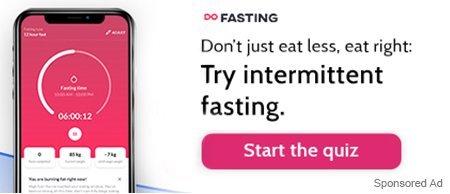What is Intermittent Fasting | Is Fasting Recommended for Teens | Intermittent Fasting Benefits for Teens | Side Effects of Intermittent Fasting in Teens | Tips for Intermittent Fasting for Teens | Why Choose Intermittent Fasting for Teens
We get this question almost weekly, Is Intermittent Fasting Safe for Teens? We will answer everything you need to know!
Intermittent fasting has gained a lot of popularity for its health benefits like weight loss, improved insulin sensitivity, more energy, etc. It is believed that intermittent fasting plan reduces the risk of developing obesity, diabetes, and even cancer.
However, there are a few concerns as well that are linked to fasting, like developing eating disorders and some unusual mental behaviors which are not well-researched.
In such a scenario, is intermittent fasting for young adults considered a safe approach? Are the benefits of intermittent fasting worth a try for teenagers? Let’s explore more on these concepts.
What is Intermittent Fasting, and How to do it?
Intermittent fasting is a type of fasting where you eat for a certain period of time and fast for the rest of the day. There are several types of intermittent fasting, like the 16/8 method, alternate-day fasting, 12-hour fasting, etc.
During intermittent fasting, you focus more on your eating and fasting window than on calorie intake. The time-restricted method of eating helps you reduce your intake of calories and food intake as it helps you avoid snacking all the time. You become more aware of your eating, and being a mindful eater, you experience several health benefits. If you want to lose weight calorie restriction is recommended.
To know more about types of intermittent fasting and their guidelines, read – A Complete Guide To Intermittent Fasting & Schedule.

Is Fasting Recommended for Teenagers? 13-19 Year Olds
Generally speaking, teens should not try any kind of fasting without proper monitoring, meaning making sure you are consuming enough calories that your body needs on a daily basis. In this growing age, a proper supply of nutrients is essential, and fasting might hamper this, leading to several health issues. But with proper monitoring, YES, you can fast as a teenager for shorter periods of time. But longer fasts are not recommended. Try following the 14/10 or 16/8 fasting which generally fits a common schedule for most people and teens.
Good news however, the right approach and careful meal planning can help achieve healthy weight loss in obese people and also may help resolve certain health problems. Under proper monitoring and with the help of your health professional, you can plan your intermittent fasting to experience its incredible benefits even at a young age.
Intermittent Fasting Benefits for Teens
Intermittent fasting can lead to reduced carb intake, so is that acceptable for teens? There are several misconceptions, like teens need excessive carbs for growth, fasting can deprive teens of essential nutrients, they should not skip breakfast, and many more. But the truth is that excessive carbs can be harmful to teens’ health.
As teenagers face a few health issues as a part of growing, following intermittent fasting can help them overcome these issues. Let’s discuss them in detail.
1. Reduces the Risk of Obesity
When you become more aware of the food you consume, you tend to avoid unnecessary calories. This helps keep your healthy weight in check. Also, the other benefits of intermittent fasting, like reduced insulin resistance and energy levels, add on to this. Watch your caloric intake, and if you want to lose weight follow a safe caloric deficit.
Several research studies have revealed that intermittent fasting can effectively help you in the weight management around your waist and belly fat.
Body image is such a touchy subject in teens these days, and during your teenage years body changes will take place.
2. Prevents the Occurrence of Diseases
Intermittent fasting improves your metabolic health and biomarkers in your body. This helps to reduce the risk of diabetes and heart disease and helps maintain your cholesterol levels.
Intermittent fasting also reduces chronic inflammation in your body which can be the root cause of chronic disease.
3. Improves Skin Health
Facing skin problems and acne are common concerns during teenage. However, you will be surprised to know that intermittent fasting can improve skin hydration, smoothness and may reduce acne.
In fact, a 12-week research study revealed that intermittent fasting could be a great non-pharmacological approach to treat skin diseases like psoriasis.
If you think fasting can cause acne, here is an interesting read for you to know more about it, Does Intermittent Fasting Cause Acne?

Possible Side Effects of Intermittent Fasting in Teens
Though there are several health benefits of intermittent fasting, when it comes to teen health, research is limited. Also, teens are most sensitive to face the consequences if not guided well. Here are some possible consequences that young adults might face.
1. Eating Disorder
There are reports that intermittent fasting may result in eating disorders. When you restrict yourself heavily from eating, it may result in distress. After a long period of not eating, hunger and cravings may take over, leading to excessive eating.
Hence, for anyone struggling with such habits or having a disordered relationship with food, intermittent fasting is not recommended. Also, breakfast is believed to help in energy balance and diet management. So skipping breakfast in teens needs to be done with caution.
2. Nutrient Deprivation
Intermittent fasting is all about when you eat, not what you eat. However, being on such a routine needs a careful eating plan to meet our nutrient requirements. Binge-eating unhealthy snacks during your eating window might result in severe nutrient deficiencies.
Your eating should focus on a healthy and balanced diet that contains more lean proteins and healthy fats. This helps with teen growth and health and is highly recommended.

Tips for Planning Intermittent Fasting for Teens
As a teenager, if you are planning to fast, it is essential to consult a health professional for better guidance. A health professional can help you keep your focus on nutritious food, not just restrictive diets. Here are some tips that can help you ease your fasting period.
- Make sure the fasting plan you choose is sustainable in the long run. If you are new to fasting, start with a short fasting duration and gradually increase your fasting window.
- Drink plenty of water and take care of your body’s electrolyte requirements.
- Avoid bingeing on unhealthy food; instead, add more nutritive healthy foods to your meal plans.
- Get quality sleep and practice relaxation techniques to avoid stress in your daily life.
Further, be aware that fasting has different effects on different individuals. Always listen to your body and know when to stop. If you feel too weak, dizzy, or disoriented, it’s a sign to stop fasting. Also, maintain a healthy relationship with the food and avoid any kind of obsession over your eating habit. Take professional advice if you face any such issues.
Intermittent fasting can be an incredible choice for weight loss and other health issues, but it’s not a perfect solution for everyone. You have to combine your fasting with a healthy lifestyle, regular physical activity, the right food choices, and proper stress management to experience any potential benefits. And always prioritize self-care over any unrealistic weight loss goals.
Does Intermittent Fasting Stunt Growth in Teens?
This is one of the most commonly asked questions. There is no data to back this claim; in fact, the truth is that nutrient deficiency can stunt your growth, not fasting. There is also evidence that says that prolonged fasting increases the release of growth hormones in our body.
However, children under the age of 12 should not try intermittent fasting for various health concerns. But if you’re a teen and overweight and want to try intermittent fasting for weight loss, with the right guidance and professional help, you can give it a go.
Why Choose Intermittent Fasting for Teens?
As mentioned earlier, intermittent fasting has several health benefits. It helps teens to lose weight, fight acne, and even help avoid anxiety and depression. The only thing teens planning to fast need to focus on is eating healthy, nutritious meals.
Intermittent fasting instills healthy eating habits in young people, reduces the frequency of eating, and helps them be more aware of the food choices they make. It helps them overcome food cravings and overeating, improves their mental sharpness, and keeps them active and alert, unlike a lot of carbs that make them tired.
By making sure you are eating right, staying hydrated, and supplying all the electrolytes needed to your body, you can experience the incredible health benefits of intermittent fasting.
To learn more on the benefits of intermittent fasting, read Benefits Of Intermittent Fasting: A Complete List.
Bottom Line – Is Intermittent Fasting Safe for Teens?
So, if you ask if intermittent fasting plan is safe for teens, the answer is yes. However, as mentioned earlier, we have to be more cautious about not being too restrictive and focusing on the body’s nutritional needs. Also, consulting a health professional before making any extreme diet changes is recommended.
Personally, I do not recommend any type of PROLONGED fasting when you are a teen, since you are developing, the nutrients in your diet are vital to your growth, and development. Do not take on any extended fasting methods when you are young.
Intermittent fasting is not just about missing your meals; it is more about being mindful of what you eat and when you eat and sustaining that eating pattern. As a teen, you don’t have to starve your body to lose weight instead, you can make healthy food choices, can stick to just 3 meals a day, avoid snacking and follow a exercise routine. So, intermittent fasting or healthy eating, whatever you choose, will benefit you in the long run. It’s always a good idea to choose nutritious foods, lean protein, and choose healthy snacks when you are eating.
Always consult with health professionals before starting any fasting program. If you have high blood pressure, or other risk factors, always get approval from your doctor before staring periods of fasting.
Are you new to intermittent fasting? Take a 21 day fasting challenge and see if that works for you. In this, you will get an action plan, daily guidance and motivation, an opportunity to join like-minded people just like you, and an option to track your progress. Join today!











